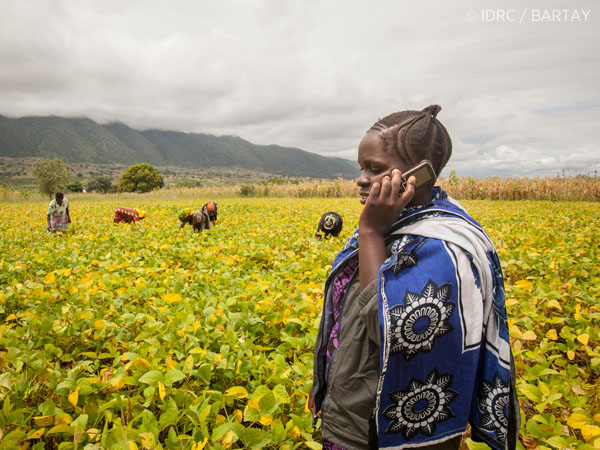Millions of smallholder farmers in remote areas do not have access to information that will help them with their farming needs. They are thus denied the opportunity to learn and apply improved and efficient agronomic practices that improve productivity and household food security.
The Canadian International Food Security Research Fund (CIFSRF), funded by the International Development Research Centre (IDRC) and Global Affairs Canada, designed a program to increase collaboration between farmers, researchers, and the public and private sectors to solve problems of food and nutrition insecurity. The program was particularly interested in looking at how to effectively and sustainably scale-up agricultural innovations in order to reach as many smallholder farmers, especially women, as possible using information and communication technologies (ICTs).
Several of the CIFSRF projects tested approaches to deliver useful agronomic advice and technologies to rural farmers through different extension models supported by ICTs, including radio, video, mobile phones, SMS, and apps, in combination with other extension methods.
In Ghana, researchers pioneered AgroTech SmartEx, a remote extension system that provides agronomic advice on improved practices for key crops. Field agents equipped with computer tablets housing this mobile app were able to reach more farmers with a one-stop bundle of agribusiness services and personalized mentoring not usually available through traditional extension systems. Participating farmers saw their incomes and productivity increase by shifting from traditional Farmer Field Schools and on-farm demonstrations to community-based extension services and e-extension systems such as the SmartEx software tool. Services were reinforced by innovative and low-cost methods of airing interactive agricultural programs over radio. Farmers with cell phones could call in to ask experts about different technologies and their uses, which reinforced learning. In a country where rural hunger remains all too common, such a model offers new opportunities for smallholder farmers to learn sustainable, modern farming practices; obtain credit and farm inputs; and find regular buyers for their crops.
In Tanzania, a multi-media campaign used a combination of radio programs, radio listening groups, comics for youth, demonstration plots, SMS interactions via mobile phone, and print extension material to provide farmers with accurate and timely information on how to increase legume crop yields and income. The project proved that the more sources of accurate and timely information that reach a farming household, the more likely they are to adopt new technologies.
Another project in Tanzania, used e-vouchers sent via mobile phones to consumers and retailers in order to reach poor remote farmers with vitamin A fortified sunflower oil. The initiative targeted the most vulnerable people—lactating mothers and children—who experience deficiencies in vitamin A. The project demonstrated how a locally-produced sunflower crop, processed at local businesses and sold by local retailers using e-vouchers as an incentive, can improve food security and stimulate local economic growth.
In Ethiopia, a unique partnership between farmers, processors, researchers and government has developed proven approaches for transforming subsistence agriculture into a dynamic and market-oriented enterprise. Participatory radio programs combined with recipe demonstrations of pulse-based food and snacks, nutrition education, and farmer field days educated farmers on the benefits of improved pulse seeds and growing practices, and the nutritional benefits of pulses.
For more information on the projects and lessons from CIFSRF visit www.idrc.ca/cifsrf
Wendy Manchur is a Program Officer with the Agriculture and Food Security Program at the International Development Research Centre (IDRC).
Contributions to YenKasa Africa are written by partner organizations to showcase their work. The views expressed in these contributions do not necessarily reflect those of all YenKasa Africa partners.


Permalink
This is very interesting, You are a very skilled blogger. I have joined your feed and look forward to seeking more of your excellent post. Also, I have shared your website in my social networks!